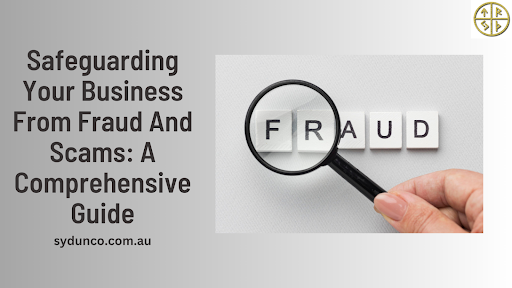Safeguarding Your Business from Fraud and Scams: A Comprehensive Guide
But in this digital age, where information and data flow freely and transactions happen at the speed of light, it isn't uncommon to become the victim of one of the latest scams or fraud.
While having a trusted commercial solicitor can help you prevent and navigate through complexities such as fraudulent scenarios, understanding the basics of scams can help you protect your business more efficiently.
And that's what this blog is about -we'll discuss various ways to safeguard your business against common frauds and scams prevalent in Australia.
Reasons you need to protect your business from scams and fraud
Financial Loss
Financial losses are a major concern. In the Australian competitive market, where profit margins can be slim, and budgets are tight, even a modest financial loss can have a profound effect. This is especially true for small and medium-sized businesses.
Reputational Damage
Apart from the immediate financial impact, the cascading reputational damage is also a concern. Eroding trust among customers, investors, and partners can have serious repercussions.
Once that trust is compromised, rebuilding it can be a steep hill to climb, can be complex and sometimes, near to impossible once the damage has been done.
Legal Complications
Navigating the complexities of the legal framework can be a daunting job, especially if you find yourself on the receiving end of a scam that leads to legal entanglements.
Regulatory bodies take data compliance matters seriously, and being ill-prepared to face them can mean disaster.
Therefore, it is recommended that you always hire a reputed legal expert for your Sydney business. You can search "business lawyer near me" to find the best legal experts near you.
What are the most common types of fraud and scams?
Phishing Attacks: Phishing emails are becoming more and more sophisticated, mimicking legitimate professional emails or messages, tricking employees into revealing sensitive information or clicking on malicious links, or opening documents containing malware which can cause data breaches, ransomware attacks, and financial losses.
Invoice Fraud: Invoice fraud involves an innocuous-looking email request a change payment details for an invoice, seemingly from a trusted supplier. Innocently complying can result in funds being rerouted into the pockets of fraudsters and the funds are usually sent overseas very quickly making recovery of the funds extremely difficult.
Identity Theft: The theft of personal and company information can be leveraged to initiate fraudulent activities. With stolen credentials, scammers can access accounts, manipulate transactions, take our loans and otherwise wreak havoc on your business's reputation.
With a commercial solicitor in your corner, you can significantly reduce the damages caused by these fraudulent attacks.
How to keep your business safe from frauds and scams?
Implement an Internal Risk Assessment: Appoint a risk assessment team that spans several risks. This diverse group will bring different perspectives to the table, making it easier to spot blind spots.
Evaluating Weaknesses in Business Processes: Evaluate each process meticulously to identify vulnerabilities. Are there gaps in your communication channels? Do any procedures lack proper authentication measures? Is there room for error in handling sensitive data?
Determine Sensitive Information for Protection: Identify and classify the types of sensitive information that your business deals with. Sensitive data may include financial data, customer data and intellectual property (patents, trade secrets, or proprietary software).
Hire Legal Help: A reputed commercial solicitor can help you more comprehensively understand the legal framework, frame policies, and stay compliant with data privacy laws.
Employee Awareness and Training: Conduct regular training sessions that cover the spectrum of fraudulent activities. Equip your team with the skills to recognise red flags, question suspicious requests, and identify potentially malicious links or attachments.
Use information technology to protect your Business: Setting up Firewalls, document encryption, anti-virus software and other steps recommended by a reputable information technology service provider.
Wrapping up
If you take a bit of extra time to implement the above strategies, you're not just protecting your business from financial loss, you're also safeguarding your aspirations and the foundation upon which your business rests. Simply search for the "best business lawyer near me" to find the most competent and experienced legal experts in your area. Good luck!
.png)
.png)


Comments
Post a Comment